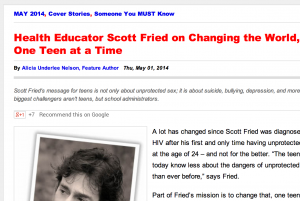As we experience life’s faithful aches, what we desire most is not to have the pain taken away from us but to be seen, validated and held in the midst of the experience. Everyone wants permission to the lament the absence of a perfect life, while at the same time, to be in the presence of a companion who witnesses the loneliness and the wound. This podcast, which explores these themes, is an excerpt from a lecture given to a group of parents in a Montreal high school in 2008.
2014 June

The online magazine, 10thousandcouples.com, featured this article about me in their May issue. It’s well written and talks about why I do what I do. I liked it and wanted to share it with you!
Read the full article here – http://bit.ly/10karticle

Name:
Brittany
Age:
14
Who Are You?
I am my own person. I’m a freshman in Las Vegas.
Whose arms do you fall into?
my best friend.
What is the one miracle you are waiting for?
Cures for cancer and disease
What is your weapon?
rubber bands
Whom do you miss the most?
People that have influenced my life.
What are you scared of?
People trying to change me
What is your favorite memory?
When you came to my camp.
When was the last time God spoke to you and what did He say?
when i met you. you opened my eyes to opportunities and made me feel like i am worth something.
What words are you holding onto in your pockets?
cutter. leave. me. alone.
What’s the best advice you’ve ever been given?
follow your heart.
What advice would you give to your parents that will help them in raising you?
understand me.
Is there sometimes an emptiness inside you and what does it feel like?
things inside me wanting to get out.
Are you enough?
no, because i am not satisfied with myself.

Herpes is a common and usually mild recurrent skin condition caused by a virus: the herpes simplex virus (HSV). Here’s some good news: herpes is not life-threatening nor does it destroy your immune system
HSV is in a family of viruses called “herpesviruses.” There are eight human herpesviruses. (I know it looks like a typo, but actually medical texts refer to herpesvirus as one word.) Also, every animal species that has been studied has its own herpesvirus: cat, carp, elephant, horse. What these viruses all have in common is the ability to hide in the body without causing symptoms, and then reappear at a later time.
The human herpesvirus family includes the Epstein-Barr virus, often abbreviated to EBV (the cause of mono), the varicella virus (the cause of chicken pox) and zoster (the cause of shingles).
Although there are several viruses in the herpesvirus family, each is a separate virus and each is different. Having one virus does not mean you will have another.
There are two types of herpes simplex viruses: herpes simplex virus type-1 (HSV-1) and herpes simplex virus type-2 (HSV-2).
The majority of oral herpes cases are caused by HSV-1 and the majority of genital herpes cases are caused by HSV-2; however, type-1 or type-2 can occur in either the genital or oral area.
Genital herpes is a sexually transmitted disease. It can cause sores in the genital area and is transmitted through vaginal, oral or anal sex, especially from unprotected sex when infected skin touches the vaginal, oral or anal area. Occasionally, it can cause sores in the mouth and can be spread by secretions in saliva. Because the virus does not live outside the body for long, you cannot catch genital herpes from an object, such as a toilet seat.
HSV-2 is spread by direct skin-to-skin contact, including vaginal, anal and oral sex. The virus can be passed whenever it is present on the skin, even right before an outbreak when no symptoms are present. Simplex-1 can be passed to the genitals and simplex-2 can be passed to the mouth during oral sex.
While some people realize that they have genital herpes, many do not. It is estimated that one in five people in the United States has genital herpes; however, as many as 90% are unaware that they have the virus. This is because many people have very mild symptoms that go unrecognized or are mistaken for another condition or no symptoms at all.
A person may show symptoms within days after contracting genital herpes or it may take weeks, months or years. Some people may have a severe outbreak within days after contracting the virus while others may have a first outbreak so mild that they do not notice it. Because of these possibilities, it can be difficult for people to know when and from whom they may have contracted the virus.
Someone with genital herpes may first notice itching, tingling or burning and pain or soreness in the buttocks, legs and groin areas. This is followed by small red bumps that appear at or near where the virus entered the body. These bumps turn into blisters or open sores a few hours to a few days later. The “classic” symptoms that most people associate with genital herpes are these sores, vesicles, or ulcers – all of which can also be called “lesions.” (The scientific literature on herpes uses the term “lesion” to describe any break or irregularity in the skin.) These classic lesions of genital herpes often resemble small pimples or blisters that eventually crust over and finally scab like a small cut. These lesions may take anywhere from two to four weeks to heal fully. Here’s the good news: they eventually do scab over and heal without leaving any scars.
The sores, which may appear on the vagina, penis, scrotum, buttocks or anus, start out as red bumps that soon turn into red, watery blisters. The sores might make it very painful to urinate. They may may open up, ooze fluid or bleed. The entire genital area may feel very tender or painful and there may be flu-like symptoms including fever, headache and swollen lymph nodes.
More good news:
If future outbreaks occur, they tend to be less severe and shorter in duration, with sores healing faster. The future outbreak can also include swollen glands, muscle aches, headache, fever, painful or difficult urination and nausea. Although symptoms can be so mild that people do not notice their future outbreaks at all.
For many people, herpes lesions can so mild that they may be mistaken for:
- insect bites
- abrasions
- yeast infection
- “jock itch” and other conditions
When a person is first infected, the immune response is not well developed and the virus is able to multiply more rapidly and in more places than it can later. Signs and symptoms during a first episode can be quite pronounced. Someone who has been exposed to genital herpes will notice genital itching and/or pain about 2 to 20 days after being infected with the virus. The sores usually appear within days afterward and may last for 2 to 4 weeks.
During this time, some people will experience a second crop of lesions, and some will have flu-like symptoms including fever and swollen glands, particularly in the lymph nodes and groin.
However, some people with genital herpes do not get symptoms or have a first episode so mild they don’t even notice it. In other cases, the first outbreak may happen years after the virus is picked up. Or, it may be a later episode, known as “reactivation,” that is first noticed months or years later.
Herpes is different from other common viral infections in that it sets up a lifelong presence in the body, called “latency.” The virus can travel the nerve pathways in a particular part of the body and hide away, virtually sleeping, in the nerve roots for long periods of time. This means that even though HSV may not be causing “cold sores” or genital signs and symptoms at a given time, it can still cause symptoms later.
It does. But if you have recently made it through a first episode that consisted of full-blown symptoms, you know something about signs and symptoms already. The good news is that the first episode is almost always the worst that HSV throws your way. Signs and symptoms of recurrent episodes (when they occur) tend to be milder and heal much more quickly, typically within two to twelve days.
If the first episode produced fairly mild symptoms, then subsequent recurrences will not usually increase in severity. But, as noted earlier, the first episode doesn’t always cause recognizable signs and symptoms. Some people have recurrent outbreaks with the so-called “classic” blister-like herpes lesions that crust over, or with painful sores. More good news: In recurrent herpes, however, this process usually takes about half the time it does in first episodes. In addition, many people have very subtle forms of recurrent herpes that heal up in a matter of days. And lastly, herpes is capable of reactivating without producing any visible lesions (asymptomatic reactivation).
Research suggests that reactivation is influenced by HSV type and how long one has been infected. People with a marked first episode caused by HSV-2 can expect to have several symptomatic recurrences a year. The average is four or five. Some may not be recognizable. In most cases, the first year has the most viral activity.
HSV-1 behaves quite differently in the genital area. People with HSV-1 in the genital area may have a marked first episode but are much less likely to have outbreaks in the first year. Their average number of symptomatic recurrences is closer to one per year and their rates of unrecognized recurrences are lower as well.
Herpes “triggers” (determining exactly what leads to an outbreak) are highly individual, but with time, many people learn to recognize, and sometimes avoid, factors that seem to reactivate HSV in their own bodies.
It occurs on the same part of the body but is not as severe. It may simply be a temporarily itchy area. What one can say with confidence is that, in general, recurrent attacks become less frequent and less severe as time goes by.
As for the reasons for recurrences, it is not really known, but based on research, there is agreement on some predisposing factors associated with outbreaks:
- Prolonged exposure to strong sunlight or ultra-violet light can trigger (usually) oral herpes.
- Trauma: surgical trauma and steroidal medication (such as asthma treatment)
- Friction in the genital area: some people (and this is pretty rare) find that they get recurrences following sex.
- Stress (emotional or physical): enough people with herpes believe that stress is involved to give it credence as a provoking factor.
- High fever and illness
- Poor diet
The frequency of outbreaks can often be managed through effective stress management and getting adequate rest, nutrition and exercise. For people with frequent outbreaks, suppressive (daily) therapy with any one of the antiviral treatments can reduce outbreaks by as much as 80%.
In the early phase of genital herpes reactivation (also called an outbreak) many people experience an itching, tingling or painful feeling in the area where their recurrent lesions will develop. This sort of warning symptom is called a “prodrome” and often comes a day or two before lesions appear. To be on the safe side, it’s best to assume that the virus is active (and, therefore, can be spread through direct skin-to-skin contact) during these times.
When a person has genital herpes, the virus lies dormant (sleeps) in the bundle of nerves at the base of the spine. When the virus reactivates (wakes up), it travels nerve paths to the surface of the skin, sometimes causing an outbreak. The nerves in the genitals, upper thighs and buttocks are connected; therefore, a person can experience outbreaks in any of these areas. Such areas include the vagina or vulva, penis, scrotum or testicles, buttocks or anus, or thighs.
Genital herpes, regardless of whether it is HSV-1 or HSV-2, does not cause symptoms on the mouth or face.
In some studies, people with herpes were completely unaware of lesions about one-third of the time that the virus was found to be active in the genital area. While recognizing lesions and other symptoms is important, this cannot always tell you when the virus is active.
Confusingly, someone who was unknowingly infected in the past may suddenly develop symptoms for the very first time, maybe years later. This resembles a recurrence, rather than a primary attack, that is not as bad.
It used to be thought that all of HSV’s active times were marked by “outbreaks” such as a sore, blister or some kind of symptom like an itch. Then researchers learned that the virus could become active without causing signs or symptoms. This phenomenon has been called a number of things, including “asymptomatic shedding” and “subclinical shedding.” But the best term for it might simply be “unrecognized” herpes. Even if you’re a person with recurring signs and symptoms that you can usually recognize as herpes, there are almost certainly days when you won’t be aware that the virus has reactivated and traveled to the skin or mucous membranes.
Since herpes is a virus, there is no cure. There are however treatments which can decrease the pain and length of the outbreaks. There are two types of treatments: episodic and suppressive.
Episodic therapy means taking medication during an outbreak to speed healing. That means you would begin taking medicine at the first sign of a prodrome and continue for five days. It doesn’t suit everybody but, for those with a reliable warning of an attack, it works well and avoids continuous suppressive therapy. But listen up, once a recurrence has started, and the outbreak appears, acyclovir or other anti-herpes drugs have no significant effect on the severity or length of the attack.
Suppressive therapy means taking antiviral medication every day to hold HSV in check so that it’s less likely to flare up and cause symptoms. It is designed to stop recurrences. This greatly reduces the number of outbreaks for most people and can prevent outbreaks altogether for some. It can also greatly reduce asymptomatic shedding (the recurrence of virus on the skin). Studies are underway to find out whether antiviral medication can help prevent transmission. People have taken it for many years without side effects or complications. However, most people with herpes don’t feel the need to take medication because their outbreaks are relatively mild. The virus is killed with soap and water.
In the old days, Acyclovir (Zovirax) use was limited by cost, but when the patent ran out in the ‘90’s, copies of acyclovir became available at a greatly reduced price allowing for much more widespread use, in particular for suppressive therapy.
Valacyclovir (Valtrex) uses acyclovir as its active ingredient but is better absorbed by the body and can be taken less often.
Famciclovir (Famvir) works much the same way acyclovir does but is also better absorbed and can be taken less often.
All three are effective. All three drugs work by disrupting the virus’ ability to reproduce. All are safe and have virtually no side effects.
No vaccines against herpes have been shown to be effective.
If an active sore is present, the virus can be cultured or seen using an electron microscope. Specific herpes DNA tests may differentiate between HSV-1 and HSV-2. Finally, blood tests can detect whether an infection has been caught in the past and whether it is type-1 or 2, or both. However, unless the infection is really very recent, when a different and transient sort of antibody is found, the blood test cannot tell for how long the infection has been present.
If someone who already has HSV-1 is exposed to their sexual partner’s herpes virus, as long as it is also type-1, no reinfection will occur. You cannot catch the same virus twice! It is true that there exists a small minority of people who are infected with both 1 and 2, but they remain a small minority.
The only surefire way to prevent genital herpes is abstinence. Those who do have sex must properly use a latex or polyurethane condom every time they have any form of sexual intercourse (vaginal, oral, or anal sex).
There is a risk of transmission to the newborn if the mother suffers a primary attack. The attack needs to be primary and in the last few weeks of pregnancy. A recurrent attack is not an equivalent risk at childbirth.
Probably the most important factor is in the transfer of antibodies from the mother to the baby across the placenta. Along with oxygen and nutrients, the placenta also transmits a ready-made immune package full of antibodies to all the infections the mother has ever suffered from, including this year’s common cold, last year’s flu and most importantly, her HSV-1 or 2. This passive immunity is quite enough to prevent any serious infection taking hold in the baby. Secondly, there are fewer virus particles in a recurrent episode than a primary attack.
There have been several studies showing that even when there are genuine herpetic sores on the vulva at the time of delivery, the baby does not develop infection. Most authorities agree that caesarean section is not necessary under these circumstances.
- Women are more likely to be infected than men;
- Gay men more than straight;
- American more than British;
- African more than European;
- European more than Indian subcontinent.
- Type-1 has a better outlook, in terms of genital recurrences, than type-2.
- There are one million new infections per year.
- 45 million people are currently living with it.
- By the age of 25, at least 80% of people worldwide have been infected with either 1 or 2.
- Herpes is not life-threatening nor does it destroy your immune system.
DISCLAIMER: The information contained in this post is intended to inform readers and is not intended to replace specific advice from a health care professional.

“Be impeccable with your word. Speak with integrity. Say only what you mean. What you put out energetically will return to you. Putting out love and gratitude perpetuates the same in the universe. The converse is also true.”
– Don Miguel Ruiz, “The Four Agreements”
What is more important than keeping your word?
Money comes and money goes. Health increases and health declines. Love comes in, but that, too is something that we must ultimately give away. I’ve always believed the one thing we get to keep in this lifetime is our word.
When we keep our agreements the rewards are immediate. We stay in balance with ourselves and we create harmony with others. We have more vitality and self-worth. We know that we can be counted on and this enhances our relationships.
When we break our agreements, we inherit a debt. We are thrown out of balance and pay a price for our inaction. We might develop self-doubt, lessen our self-esteem and deteriorate our relationships with others. We lose another’s trust and shut ourselves off from feeling alive.
My friend David calls it a “Trust Bank.” We either deposit or withdraw from that trust bank account every time we keep or break an agreement. In his words “some people have even speculated that there’s a correlation between our ‘trust bank’ balance and our ‘real bank’ balance.” Think out about that one for a second!
Is your trust bank balance in deficit or is it overflowing?
Remember these points:
- Keeping your word keeps you whole.
- Integrity is an attractive quality; it brings healthy people into your life.
- Make only those agreements you intend to keep.
- Write down the agreements you make.
- Renegotiate the agreement if you determine it will throw you out of balance.
What agreements can you keep this week that can increase your trust bank balance and add to your aliveness?
What does it mean to be sacred? To be sacred is to include the fear and the unknown into your experience of life. It is found in moments of woundedness as well as in times of achievement. It is becoming acquainted with the notion that you do not have to be put back together at all. Being broken, being confused, being a contradiction is normal. Sacredness is making room for acceptance of such doubt. This talk was given in front of a live audience in Boulder, Colorado in the summer of 2000.

Image created by Rebecca Schneider
Name:
Charlotte
Age:
15
Who Are You?
I am a teenage girl that is honest with everyone else but herself.
Whose arms do you fall into?
My best friend in the whole world, Emily.
What is the one miracle you are waiting for?
I am waiting for him to tell me he loves me because I know he feels the same way.
What is your weapon?
My weapon are my tears.
Whom do you miss the most?
I miss Leah the most. She was too young to die.
What are you scared of?
I’m scared that my life will fall apart because it’s taking me too long to get back to where I was. I’m terrified of ending up alone.
What is your favorite memory?
My favorite memory was when I was little and I dressed up as a bride and went out to Chinese food like that. I wish that I still had no cares in the world like I did when I was a kid. I want to stop growing up. Life is only getting more complicated and hard.
When was the last time God spoke to you and what did He say?
I was in Israel and I was putting my note in the Western Wall. He told me that it was all going to be OK and work out. I’m still trying to figure out if I completely believe Him.
What words are you holding onto in your pockets?
I’m holding onto the words “life is beautiful.” If I don’t think that, then I can’t accept anything that is happening in my life, ever. Those words keep me going everyday.
What’s the best advice you’ve ever been given?
My friends told me that I am too negative about everything. They told me that I can’t live in the past because that can’t change anything. You have to live each day like it’s your last and make the most out of any situation that is thrown at you. Live for the future, because that is what will keep you motivated to make life better.
What advice would you give to your parents that will help them in raising you?
Yelling never solves anything. It just makes situations worse. You have to treat each other with respect. That’s the only way that a family will stay close.
Is there sometimes an emptiness inside you and what does it feel like?
The emptiness of not being wanted by anyone is always inside me. My biggest fear is to end up alone, so that always is in my mind, which causes the emptiness.
Are you enough?
I am not enough because I will never be able to fully except myself for who I am on the inside and outside.
I’m flattered and excited that North Jersey Pride thinks “this could be the most important event you attend this year.” If you’re in NJ/NY, I hope to see you there tonight!
TONIGHT: Wine, food and absolutely life-changing talk by @iamscottfried, with intro by Jane Clementi of @TylersSpace pic.twitter.com/Vfe9ayZXAw
— North Jersey Pride (@PrideInNJ) June 4, 2014
Is it a cold sore?
Is it a fever blister?
Is it herpes?
It’s actually all of the above.
Oral herpes is commonly referred to as “cold sores” and “fever blisters” typically caused by herpes simplex virus type 1 (HSV-1). More than 50% of adults in the United States have oral herpes. Most people get it when they are children by receiving a kiss from a friend or relative.
The information in this week’s Topic Tuesday comes from one of my favorite Internet sites for sexual health and wellness information, www.kidshealth.org.
Here’s the link:
http://kidshealth.org/teen/infections/common/cold_sores.html#cat20017
Cold sores, which are small and somewhat painful blisters that usually show up on or around a person’s lips, are caused by herpes simplex virus-1 (HSV-1). But they don’t just show up on the lips. They can sometimes be inside the mouth, on the face, or even inside or on the nose. These places are the most common, but sores can appear anywhere on the body, including the genital area.
Genital herpes isn’t typically caused by HSV-1; it’s caused by another type of the herpes simplex virus called herpes simplex virus-2 (HSV-2) and is spread by sexual contact. But even though HSV-1 typically causes sores around the mouth and HSV-2 causes genital sores, these viruses can cause sores in either place.
HSV-1 is very common. If you have it, chances are you picked it up when you were a kid — most likely from close contact with someone who has it or getting kissed by an adult with the virus.
Although a person who has HSV-1 doesn’t always have sores, the virus stays in the body and there’s no permanent cure.
When someone gets infected with HSV-1, the virus makes its way through the skin and into a group of nerve cells called a ganglion (pronounced: GANG-glee-in). The virus moves in here, takes a long snooze, and every now and then decides to wake up and cause a cold sore. But not everyone who gets the herpes simplex virus develops cold sores. In some people, the virus stays dormant (asleep) permanently.
The truth is, no one knows for sure. A person doesn’t necessarily have to have a cold to get a cold sore — they can be brought on by other infections, fever, stress, sunlight, cold weather, hormone changes in menstruation or pregnancy, tooth extractions, and certain foods and drugs. In a lot of people, the cause is unpredictable.
Here’s how a cold sore develops:
- The herpes simplex virus-1, which has been lying dormant in the body, reactivates or “wakes up.”
- The virus travels toward the area that was originally infected (like a person’s lip) via the nerve endings.
- The area below the skin’s surface, where the cold sore is going to appear, starts to tingle, itch, or burn (called a “prodrome”).
- A red bump appears in the area about a day or so after the tingling.
- The bump becomes a blister.
- The blister dries up and a yellow crust appears in its place.
- The scab-like yellow crust falls off and leaves behind a pinkish area where it once was.
- The herpes simplex virus travels back to the ganglion (nerve cells), where it goes back to “sleep.”
Cold sores are really contagious. If you have a cold sore, it’s very easy to infect another person with HSV-1. The virus spreads through direct contact — through skin contact or contact with oral or genital secretions (like through kissing). Although the virus is most contagious when a sore is present, it can still be passed on even if you can’t see a sore. HSV-1 can also be spread by sharing a cup, eating utensils, or lip balm or lipstick with someone who has it.
Listen up, this one is important
If you or your partner gets cold sores on the mouth, the herpes simplex virus-1 can be transmitted during oral sex and cause herpes in the genital area.
Herpes simplex virus-1 also can spread if a person touches the cold sore and then touches a mucous membrane or an area of the skin with a cut on it. Mucous membranes are the moist, protective linings made of tissue are are found in certain areas of the body (like the nose, eyes, mouth, and vagina). So it’s best to not mess with a cold sore — don’t pick, pinch, or squeeze it.
Actually, it’s a good idea to not even touch active cold sores. If you do touch an active cold sore, don’t touch other parts of your body. Be especially careful about touching your eyes — if it gets into the eyes, HSV-1 can cause a lot of damage. Wash your hands as soon as possible. In fact, if you have a cold sore or you’re around someone with a cold sore, try to wash your hands often.
Cold sores can actually be dangerous for people whose immune systems are weakened (such as infants and people who have cancer or HIV/AIDS) as well as those with eczema. For people with any of these conditions, an infection triggered by a cold sore can even be life threatening.
Cold sores normally go away on their own within 7 to 10 days. And although no medicines can make the infection go away, prescription drugs and creams are available that can shorten the length of the outbreak and make the cold sore less painful.
If you have a cold sore, it’s important to see your doctor if:
- you have another health condition that has weakened your immune system
- the sores don’t heal by themselves within 7 to 10 days
- you get cold sores often
- you have signs of a bacterial infection, such as fever, pus, or spreading redness
To make yourself more comfortable when you have a cold sore, you can apply an ice pack wrapped in a towel or anything cool to the area. You also can take an over-the-counter pain reliever, such as acetaminophen or ibuprofen.
Reviewed by: Mary L. Gavin, MD
Date reviewed: February 2014
You can learn more about oral herpes here:
http://www.ashasexualhealth.org/std-sti/Herpes/oral-herpes.html
DISCLAIMER: The information contained in this post is intended to inform readers and is not intended to replace specific advice from a health care professional.

In my travels, I took a survey and gathered some answers from many of my students:
Being noticed by God
Being comfortable with yourself
Not trying to change yourself for anyone regardless of what others say
To be whatever you want to be
Living up to your expectations
Following your dreams
Thinking twice on who I am
Taking in all parts of life, not just the easy, but also the hard
To know that you exist with all that is inside of you,
the good and the not so good
Being true to yourself
The unchanging parts of yourself
I’m not too fond of the word but I do have lots of respect
for its meaning
Succinctly put, “I, myself, am more Divine than any I see.”
The opposite of sacredness is not disgrace.
It is not failure. It is not confusion. Just because we don’t feel sacred does not mean that we are not sacred. Sacredness is not political correctness. Nor is it being perfect, doing it the right way, living the life our parents would approve of or even believing in God. The part of you that is sacred is not the part that is consummate or pure. It is not about chastity or an ostensible sense of holiness. It has nothing to do with having an awesome basketball game, the straightest hair or the highest grade point average in your class. It is not measured by your driving record, your parent’s income or your body weight.
The part of you that is sacred is the part that is searching.
It is the part caught in the struggle to reclaim a holiness you think you have lost or given away or were never born with. The sacredness in you is the searching for connection to the sacredness in others who are searching for connection to the sacredness in others. It is an alliance of hope, a union with others who seek a common voice. It is part of the ground you walk upon and the air in your lungs.
To be sacred is to include the fear and the unknown into your experience of life. It is found in moments of woundedness as well as in times of achievement. It is becoming acquainted with the notion that you do not have to be put back together at all. Being broken, being confused, being a contradiction is normal. Sacredness is making room for acceptance of such doubt.
It is not up to you to decide whether or not you are sacred; it is up to you to accept, encompass and embrace that you are sacred.
A mother from Massachusetts once emailed me to say, “Casey held up her cell phone this morning and announced that she had deleted all the phone numbers of the guys who do not see her as sacred!”
Sacredness is the source of your true reality. It is the movement of spirit within a heart that is unanchored by loss. Yet it is also the unfolding of delight within and the lift you give to victory.
When it seems that life has been reckless with your dreams and you feel abandoned by God, you are still sacred. When you are confused and when you are victorious, you are still sacred. When you are in a state of negative self-judgment or positive self-approval, you are sacred. In your loneliness or sense of desolation, you are sacred. In your glory and resplendency, you are sacred.
I salute you – all that you stand for, struggle with and believe.
